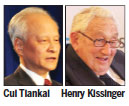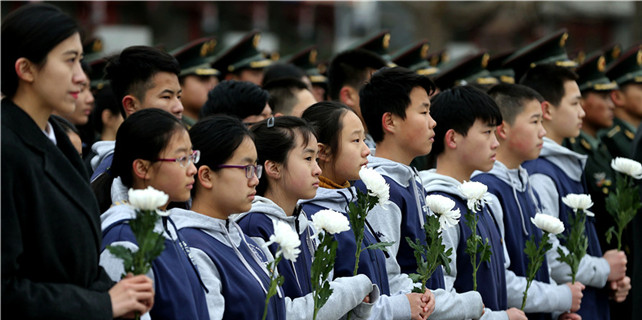Kissinger, Cui assert policy of one China




Henry Kissinger said on Wednesday that he expects US President-elect Donald Trump to honor the US' one-China policy once he studies the framework more closely.
Trump said over the weekend that he didn't feel "bound by a one-China policy" after breaking four decades of diplomatic precedent by talking on the phone with Taiwan leader Tsai Ing-wen on Dec 2.
"It's not the best way to make Taiwan the key issue at the beginning of this dialogue. It might not be the most efficient way," the former secretary of state said at a panel titled US-China Relations in the Trump-Xi Era held by the Cheung Kong Graduate School of Business and Committee of 100 in New York.
"Every president of the United States since 1971 from both parties has accepted this framework," said Kissinger, who participated in the establishment of the policy and has met with both President Xi Jinping and Trump after Trump's election on Nov 8.

"I do not expect it to be overturned," he said. "I am optimistic that the cooperative way will prevail."
Chinese Ambassador to the US Cui Tiankai said on Wednesday at The US-China Business Council (USCBC) 2016 Gala in Washington that the political foundation of China-US relations should not be undermined; instead, it should be preserved.
"The basic norms of international relations should be observed, not ignored, certainly not be seen as something that you can trade off," Cui said. "And indeed national sovereignty and territorial integrity are not bargaining chips, absolutely not."
"We still remember the days (when) President Nixon visited China with a little trade between us. Last year, we had over $550 billion bilateral trade. We have really traveled very far and achieved a lot," Cui said.
Citing Xi's remarks at the APEC CEO Summit last month, Cui said "China will not shut the door to the outside world but will open it even wider.
"China will make its investment climate more open, favorable and transparent to allow foreign companies to share in China's growing opportunities," Cui said.
"Bilaterally, we have such a huge potential for further cooperation," he said.
"We should do more to help each other in our respective economic structure; we should do more to have better economic policy coordination, and we will certainly should do more to help each other build infrastructure and open market access to each other."
Breaching the one-China principle "will seriously affect peace and stability across the Taiwan Straits", An Fengshan, spokesman for the Taiwan Affairs Office of the State Council, said on Wednesday in response to Trump's recent remarks.
"There can be no talk of a healthy and steady development of China-US ties if the basis of sticking to the one-China principle is disturbed or damaged," An said at a regular news conference.
"Our position against Taiwan independence is steadfast, and we are determined, confident and capable of containing Taiwan independence," he said.
France's top diplomat expressed discomfort on Wednesday with Trump's aggressive stance toward China, the US' largest trade partner.
"Watch out for China. ... It's a big country. You can have disagreements with China, but you don't talk like that to a partner," said French Foreign Minister Jean-Marc Ayrault on France 2 television.
The Foreign Ministry urged Washington on Wednesday to avoid "unnecessary disturbances" to bilateral ties.
It was responding to remarks made on Tuesday by US Deputy Assistant Secretary of Defense Abraham Denmark, who said defense spending in Taiwan has not kept pace with the "threat" posed by Beijing and should be increased.
Shi Yinhong, director of the Center of US Studies of Renmin University of China, said that if the one-China policy were unilaterally overturned, "there possibly will be no talk of China-US ties".
"And it will encourage independence forces in Taiwan, which might even lead to wars and greatly endanger peace in the Pacific region."
"It is deliberate; it's intentional; it's strategic," Cheng Li, director of the John L. Thornton China Center at the Brookings Institutionr, said of the phone call.
Tao Wenzhao, a researcher of US studies with the Chinese Academy of Social Sciences, said he believes that Trump is using the Taiwan issue to bargain with China for trade benefits and also to contain China.
On Trump's pick of Exxon Mobil CEO Rex Tillerson as secretary of state, Kissinger said he is not worried about Tillerson's close ties with Russian President Vladimir Putin.
"I pay no attention to this argument that he is too friendly with Russia," he said. "He would be useless at the head of Exxon if he was not friendly with Russia.
"Nobody can meet every single qualification for secretary of state," Kissinger said. "I think it's a good appointment."












